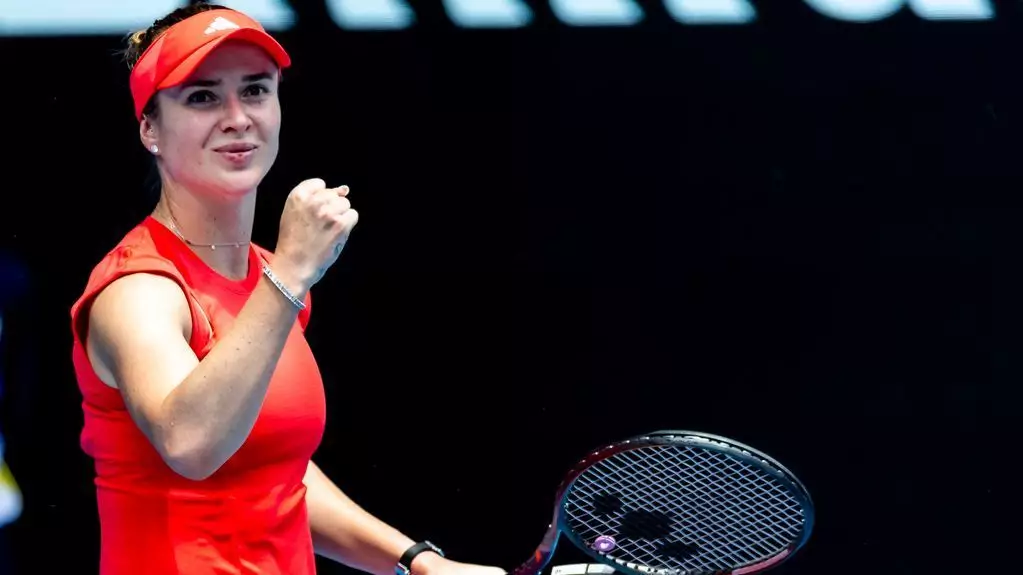In a gripping match at the Australian Open, Elina Svitolina showcased her tenacity as she clawed back from a shaky start to claim a decisive victory over Veronika Kudermetova. Trailing 4-1 in the first set, Svitolina shifted the momentum dramatically, winning 11 out of the next 12 games and finishing the match with a convincing score of 6-4, 6-1. This triumph marks Svitolina’s return to the quarterfinals of a Grand Slam for the first time since 2019, highlighting both her skill and resilience in the face of adversity.
Svitolina’s history is marked by significant challenges and triumphs, and this match underlines her determination to regain her place among the elite in women’s tennis. As the 30-year-old Ukrainian athlete reflects on her journey, one cannot overlook the myriad of personal and professional transformations she has undergone. After marrying French tennis player Gael Monfils in 2021 and welcoming their daughter, Skai, in 2022, Svitolina’s achievements in Melbourne resonate deeply on a personal level. She remarked, “Feels like a lifetime ago,” illuminating the transitions in her life that have shaped her as both a player and a person.
Svitolina’s performance against Kudermetova was not simply about skill but also about mental fortitude. Early struggles saw her drop two service games, pushing her to confront the daunting circumstances head-on. “It’s the only thing I can do when things are not going your way, put your head down and get back to work,” she explained. This mentality underscores an essential aspect of high-performance sports: the ability to focus and adapt under pressure. Many athletes have faltered when the chips are down, but Svitolina’s refusal to succumb to early setbacks is a testament to her competitive spirit.
Interestingly, Kudermetova did seek medical attention during the match, a moment that could have provided a psychological edge to Svitolina. The shift in play dynamics was palpable, and while Kudermetova attempted to rally with moments of aggression, Svitolina’s strategic play proved more effective. The match delineated a clear narrative – one of struggle and recovery, illustrating that tennis is more than just physical prowess; it’s a game of mental agility as well.
Symbolism of Unity
In the wake of her victory, Svitolina expressed her pride in representing Ukraine, inscribing a powerful message on a TV camera. “The Spirit of Ukraine” alongside a heart symbol encapsulates the emotional weight of her matches, especially given the current context surrounding her home country. Throughout the match, the colors of Ukraine were present in the crowd, reinforcing the sense of community and support that extends beyond the sport. Svitolina’s red outfit contrasted symbolically with the blue and yellow flags waving in the audience, representing her dual fight—both on and off the court.
The absence of a handshake at the net between Svitolina and Kudermetova has stirred conversations about the complexities surrounding athletes from countries in conflict. While there was no obvious hostility, it does beg the question of how personal and international strife intersects in professional sports. Svitolina’s journey is emblematic of a broader narrative, one that engages with themes of resilience, unity, and identity.
Moving forward, Svitolina is set to face Madison Keys, another formidable opponent. Keys has been on a roll, extending her win streak to nine matches, and emerged victorious in her encounter against Elena Rybakina, the 2022 Wimbledon champion. This upcoming match promises to be fiercely competitive, with both players aiming for a spot in the semifinals. “Her serve is such a weapon,” Keys remarked, alluding to the tactical approaches that will be central to their battle.
In closing, Elina Svitolina’s latest performance at the Australian Open serves as a reminder of her extraordinary resilience and the rich tapestry of stories that intertwine in the world of tennis. With the quarterfinals on the horizon, fans eagerly await to see if Svitolina can continue her remarkable run, further solidifying her place as one of tennis’s most compelling narratives.

